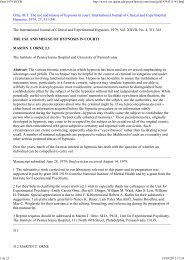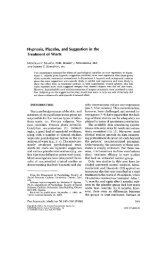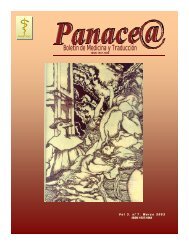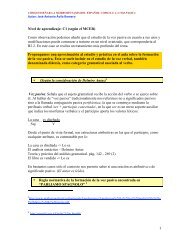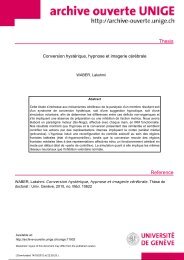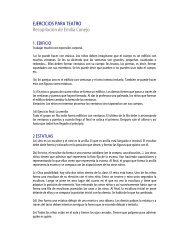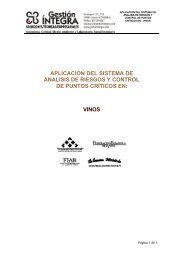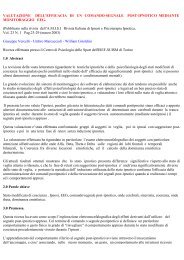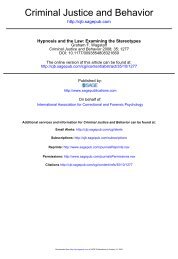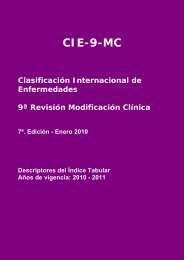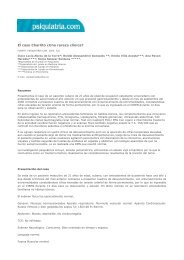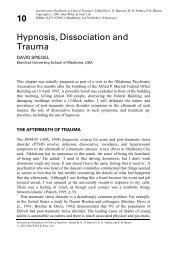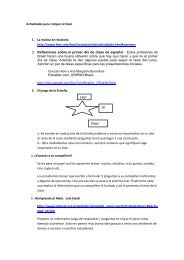Diccionario etimológico comparado de la lengua castellana
Diccionario etimológico comparado de la lengua castellana
Diccionario etimológico comparado de la lengua castellana
You also want an ePaper? Increase the reach of your titles
YUMPU automatically turns print PDFs into web optimized ePapers that Google loves.
i<br />
:<br />
GENTI GEOGE 2783<br />
Gentili-dad. f.<br />
CU. etim. GENTIL. Suf. -dad<br />
SIiiN.— 1. Falsa reli{j;ión que profesan los<br />
gpntiles ó idó<strong>la</strong>tras :<br />
Quién en medio <strong>de</strong> <strong>la</strong>s tinieb<strong>la</strong>s <strong>de</strong> <strong>la</strong> fientilidad alcanzó<br />
tanta luz? Fr. L, Gran. Tr. Ain. Dios. part. 1,<br />
cap 4.<br />
2. Conjunto y agregado <strong>de</strong> todos los gen-<br />
tiles:<br />
Para los sabios <strong>de</strong> <strong>la</strong> Gentilidad escribió un libro <strong>de</strong><br />
<strong>la</strong> naturaleza <strong>de</strong>l alma. Maner. Pref. § 7.<br />
Gentil-ismo. m.<br />
Cfr. etim. gentil. Suf. -ismo.<br />
SIGN.— GENTILIDAD :<br />
En <strong>la</strong> salvación <strong>de</strong> los pre<strong>de</strong>stinados que <strong>de</strong> aquel<br />
Gentilismo hau subido al Paraíso. Oe. H. Chil. lib. 5,<br />
cap. 1.5.<br />
Gentil-izar. n.<br />
Cfr. etim. gentil. Suf. -har.<br />
SlGN.— Practicar ó seguir los ritos<br />
gentiles<br />
<strong>de</strong> los<br />
Mandó que los Fieles no ayunasen, porque en ellos<br />
los Gentiles celebraban sus ayunos, y no pareciese que<br />
los Cristianos gentilizahan con ellos. Gil Gonz. Gr.<br />
Madr. lib. 1, cap. 7.<br />
Gentil-mente, adv. m.<br />
Cfr. etim. gentil. Suf. -mente.<br />
SIGN.— 1. Con gentileza.<br />
2. Á manera <strong>de</strong> los gentiles.<br />
Gent-ío. 111.<br />
Cfr. etim. gente. Suf. -io.<br />
SIGN.— Concurrencia ó afluencia <strong>de</strong> número<br />
consi<strong>de</strong>rai)le <strong>de</strong> personas en un punto:<br />
E allegó gran gentío <strong>de</strong> Al<strong>de</strong>anos y peones. Chron.<br />
Gen part. 1. cap. 135.<br />
Gent-o, a. adj.<br />
Cfr. etim. gente.<br />
SIGN.— ant. Gentil, bello, gal<strong>la</strong>rdo.<br />
Gent-ual<strong>la</strong>. f.<br />
Cfr. etim. gente. Suf. -ualía.<br />
SIGN.— <strong>de</strong>spect. Gente <strong>la</strong> más <strong>de</strong>spreciable<br />
<strong>de</strong> <strong>la</strong> plebe.<br />
Gent-uza. f.<br />
Cfr. etim. gente. Suf. -uza.<br />
SIGN.— <strong>de</strong>spect. gentual<strong>la</strong>.<br />
Genu-és, esa. adj.<br />
Cfr. etim. gen-ojo. Suf. -és.<br />
SIGN.— ant. genovés. Api. á pers , usáh.<br />
t. c s.<br />
Genu-flexión. f.<br />
ETIM.—De los nombres <strong>la</strong>tinos genu.,<br />
rodil<strong>la</strong>, cuya elim. cfi'..en gen-ojo, gen-<br />
OLLo, y Jlex-io, -on-is, -on-ein, el acto <strong>de</strong><br />
dob<strong>la</strong>r, doble^^ar, |)le;;ar; piiin. <strong>de</strong> flexión<br />
(cfr.). Etimológ. siírnifica acto <strong>de</strong><br />
dob<strong>la</strong>r <strong>la</strong>s rodil<strong>la</strong>s, <strong>de</strong> arrodil<strong>la</strong>rse. Le<br />
correspon<strong>de</strong>n: ital. f/enuflessione; franc.<br />
(jénujlexion; uv^\. (jenuflexion, fienaflection;<br />
cat. genujlexió; port. rjenujlexao.,<br />
etc. Cfr. hinojo, 2"; flexible, etc.<br />
—<br />
SlGN.— Acción y efecto <strong>de</strong> dob<strong>la</strong>r <strong>la</strong> rodil<strong>la</strong>,<br />
bajándo<strong>la</strong> hacia el suelo, ordinariamente en<br />
señal <strong>de</strong> reverencia :<br />
Con que se convence <strong>de</strong> camino <strong>la</strong> impiedad <strong>de</strong> loa<br />
que ponen <strong>lengua</strong> en <strong>la</strong>s inclinaciones, genuflexiones y<br />
postraciones que se acostumbran en los choros <strong>de</strong> <strong>la</strong>s<br />
Religiones. 3Iarq. Gob. li . 2, cap. ItJ.<br />
Genu-ino, ina. adj.<br />
Cfr. etim. genio. Suf. -ino.<br />
SIGN.— Puro, propio, natural, legítimo :<br />
Estaban poco conformes con el texto genuino Griego.<br />
Colm. Escrit. Seg. pl. 714.<br />
Geo-céntr-ico, ica. adj.<br />
Cfr. etim. gea y céntrico.<br />
SIGN.— 1. Perteneciente ó re<strong>la</strong>tivo al centro<br />
<strong>de</strong> <strong>la</strong> Tierra.<br />
2. Astron. Aplícase á <strong>la</strong> <strong>la</strong>titud y longitud<br />
<strong>de</strong> un p<strong>la</strong>neta visto <strong>de</strong>s<strong>de</strong> <strong>la</strong> Tierra.<br />
Geo-da. f.<br />
Cfr. etim. gea. Suf. -da.<br />
SlGN. GcoL Hueco en una roca, tapizado<br />
<strong>de</strong> una substancia generalmente cristalizada.<br />
Geo-<strong>de</strong>s-ia. f.<br />
Cfr. etim. gea y daño. Suf. -ia.<br />
SIGN.— Parte <strong>de</strong> <strong>la</strong> geometría, que trata <strong>de</strong><br />
<strong>la</strong> medición dal terreno en general.<br />
Geodés-ico, ica. adj.<br />
Cfr. etim. geo<strong>de</strong>sia. Suf. -ico.<br />
SIGN. - Perteneciente ó re<strong>la</strong>tivo á <strong>la</strong> geo<strong>de</strong>sia.<br />
Geo<strong>de</strong>s-ta. m.<br />
Cfr. etim. geo<strong>de</strong>sia. Suf. -ta.<br />
SIGN.— 1. Profesor <strong>de</strong> geo<strong>de</strong>sia.<br />
2. El que se ejercita habitualmente en el<strong>la</strong>.<br />
Geó-fag-o, a. adj.<br />
Cfr. etim. gea y faba.<br />
SIGN.—Que come tierra. Ú. t. c. s.<br />
Geo-gen-ia. f.<br />
ETIM. — Del grg. y£w- <strong>de</strong>rivado <strong>de</strong>l<br />
nombre vea, tierra, prim. <strong>de</strong> gea (cfr.)<br />
y GEN-IA <strong>de</strong> vév-c? vév-e-ai-;, origen, nacimiento,<br />
principio; cuya etim. cfr. en génesis.<br />
Étimológ. significa lo que trata<br />
<strong>de</strong>l origen <strong>de</strong> <strong>la</strong> tierra. De geo-ge-nia<br />
<strong>de</strong>scien<strong>de</strong> geo-gén-ico, mediante el suf.<br />
•ico. Del mismo yéo)- y el nombre vvtoji-c;.<br />
conocimiento (cuya etim. cfr. en<br />
gnóstico), se lia formado el nombre<br />
GEo-GNO-si-A (^conocimiento <strong>de</strong> <strong>la</strong> fierra),<br />
prim. <strong>de</strong> geo gno-sta y geo-gnóst-ico.<br />
De VEO) y yóv c; (=Yov-v-\ nacimiento,<br />
origen, generación (cuya elim.<br />
cfr. en gen-io, gén-ero, gén-e-si-s), se<br />
compone geo-gon-ía ( = origen <strong>de</strong> <strong>la</strong><br />
tierra), prim. <strong>de</strong> geo-gón-ico (cfr. suf.<br />
-ico). De 7c'ü)- y YP^f^^i escribir, <strong>de</strong>scribir<br />
(cuya etim. cfr. en gr.áfico), se compone



